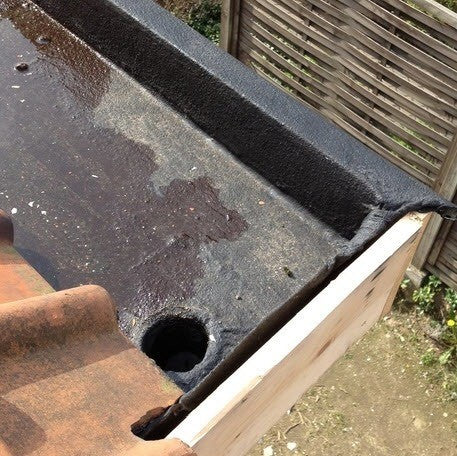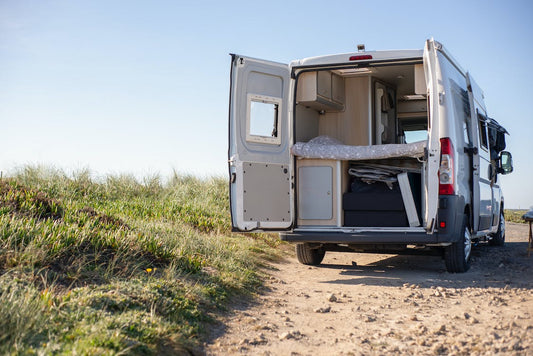
Fixing Roof Water Leaks
Insurances agencies state that 80% of building insurance claims come from water leaks and water damage.
Costly and extensive damage to houses & buildings are often the end result of roof water leaks.
View video below
Paul Evans, Managing Director Findlay-Evans Waterproofing (F.E.W) and President of the Australian Institute of Waterproofing (AIW) says " water can track a significant distance from the point of roof entry which makes fixing roof water leaks all the more challenging".
"I've seen devastating consequences of not fixing leaking roofs - once water is in , the whole problem escalates, " said Mr Evans.
Waterproof Coatings for Rooftops |
Finding a waterproofing solution is not just identifying the roof leak but also using quality products together with correct methodology to fix the problem.There are a multitude of waterproofing products on the market however not all are suitable to use as a roof membrane and particularly for roof repairs & remediation. Traditional sheet waterproofing methods involve joins/seams which require fastening or glueing down - these are areas of weakness that may lead to water leaks in the future. And there are roof waterproofing products that use flames, heat, fumes and Volatile Organic Chemical (VOCs) which are not suitable for application in the DIY market. |
Waterproofing Membranes |
Fix Roof Leaks Easily!
Liquid Rubber is a versatile repair product for patching leaks in roofs, repairing cracks along parapet walls and flashings and sealing around roof penetrations associated with skylights, rooftop air conditioners, and pipe work and is an extremely effective sealant to repair box gutters. It's the easiest system to apply because you just paint Liquid Rubber on.
|
Liquid Rubber Waterproofing Membrane
is perfect for the DIY Market

Liquid Rubber Membrane

Liquid Rubber Membrane

Q. Will Liquid Rubber crack and “dry out” like the old bitumen type coatings.
A. NO. It will not crack or split as it is extremely flexible and is U.V. Stable.
Do I need any special tools to prepare and install the system?
A. No. There are no specialist tools required.
The roof surface needs to be clean & then dry prior to application.
A high pressure washer (if available) is useful for preparation or even a good pressure garden hose to wash down, otherwise you simply wire brush & sweep down area then apply Liquid Rubber by paint brush and / or roller.
Q. Does the roof need to be perfectly dry before installation?
A. Your roof will never be perfectly dry as all flat roofs have a certain amount of water retention although the drier the better even though the rubber membrane breathes due to it being vapour permeable allowing you to install to the roof with minimal fuss on a damp surface.
Q. What surfaces can the Liquid Rubber be painted to?
A. Liquid rubber can be painted on almost any sound surface like metal, corrugated iron, timber, concrete, also corrugated asbestos sheeting, encapsulating & rendering asbestos safe.
Importance of Waterproofing Preparation
Watch a detailed explanation with one of our DIY customers
Roof Waterproofing Membranes |
|
Liquid Rubber has the following properties: · Flexibility – membranes moves with normal climatic fluctuations of roof expansion and contraction. · UV Stable – membranes is UV resistant- long life. · Robust Adherence – membrane has strong bond to existing roof surface -metal, concrete, timber & asbestos. · Contours to Shape – rooftops often involve air conditioning utilities, skylights etc. A Liquid Rubber waterproofing membrane seals around all roof penetrations.
|
Using Liquid Rubber for Roof Coating
Liquid membranes can very often be applied directly over most existing roof surfaces.
Liquid Rubber is a long term solution for roof & gutter leaks and also cost effective & very easy for the DIY market.
Surface Preparation Prior to Waterproofing Application |
As with all waterproofing membranes, the surface must be dry and free of anything that could adversely affect adhesion.→ You should be sure to remove all loose, scaling, peeling, blistering, chipping, cracking, chalking or gravel, dust, dirt, sand, soot, grease, oil, uncured tar, wax, soap film, animal fats or petroleum-based residue, coal tar, chlorine, salts, efflorescence, or any other chemically reactive substance (solvents) that may affect adhesion. → Wire brush or if needed high-pressure water blast should be used to thoroughly clean all surfaces prior to application if any of the above conditions exist. → Surface should be free of mould, mildew, dirt & as dry as possible. → Mildew and similar growths can be killed with 1 part household bleach to 2 parts water, followed by a thorough rinse with clean water. → All surfaces must then be allowed to THOROUGHLY DRY before proceeding with application. |
| How Long Does Liquid Rubber Take to Cure ? |
LIQUID RUBBER typically cures within 24-48 hours (depending on application thickness, temperature, and relative humidity).You will notice the product is touch dry with-in 2-3 hours, however the Liquid Rubber is still going through a very important process called “curing” which may take one to several days to fully complete.
If “active” water is trying to push through a wet membrane – it will not cure. i.e like concrete with water saturated through the porous material. Blistering can occur if vapour is trapped in substrate. Allow blisters to dissipate over time- repair if holes occur. |
Certified Waterproofing Applicators
"My preferred option is using the new generation Liquid Applied Membranes - these liquid membranes provide the ultimate solution to to fix water leaks in roofs & gutters.
"These eco-friendly liquid membranes are safe to apply and can be brush or roll on application.
Commercial Waterproofing Projects - Melbourne
- Paul Evans is Manager/Director of Findlay-Evans Waterproofing, located in Melbourne and also Vice President of Australian Institute of Waterproofing (AIW) - Paul has been working in the construction and waterproofing industry for more than 30 years.
Website: www.waterproofingfew.com.au
Further information about Liquid Rubber visit our website: www.liquidrubbermelb.com.au




